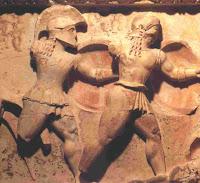
Thorfinn the Shallow Minded
-
Posts
1.198 -
Joined
-
Last visited
-
Days Won
15
Posts posted by Thorfinn the Shallow Minded
-
-
The quality of the art is obvious to be sure, but I would be skeptical regarding the use of shields; the peltast holding a shield weighing something to the figure of 15 lbs. Likewise, I am fairly sure that the aspis was not designed to be strapped onto the back. I've never seen or read any primary sources which attests to this practice. If anyone can provide evidence against either of these points, please do so, I am genuinely interested to know if I am wrong. I should probably stop since this might derail the topic too much.
-
 2
2
-
-
Perhaps it could have some aura as well such as improved movement speed within a particular range. This might seem deceptively useless, but could help with fishing and trade longterm while also giving a better escape window for damaged units.
-
 3
3
-
-
I would say probably not. Spartans were known for braiding their hair, not skiritai to my understanding. As for linen armour, I would say that is plausible for them to wear, maybe even no armour. I would be cautious about abandoning the hoplon. Although their role in the phalanx was different from mainline troops, they definitely fought in it, and given that heavily armed peltasts had been incorporated into most armies of this time, I would say it is completely implausible for skiritai to be armed that way.
-
 2
2
-
-
I'd say that the issue with walls is that at the moment they are highly resistant for town age standards. Whether it is through a technology or an automatic upgrade when the player reaches city phase, walls should have less hp in the town phase.
-
 2
2
-
 1
1
-
-
I understand your logic, but there are few Republican Roman examples I can think of that played a prominent militaristic role, especially during the Punic Wars, which is what I think is the general timeframe 0 A.D. is attempting to model. Compared to Scipio Africanus or Fabius Maximus, it's hard to match with anyone else. Carthage also was renowned for its navy, even more so than Rome, and they have no admiral representing them.
-
Clearly the metal is for making the dog tags.
-
 5
5
-
-
I think that there should be some limits to house based production though. That could easily become exploitable unless there is some restrictions. I'd say that stables would be the best call for them even if it is not the most historically accurate option for where dogs would be trained.
-
Personally I think that Civic Centres should not cost metal. There doesn't seem to be much of a thematic reason for that resource being included, and it forces players to opt for an odd build order when they are only trying to expand some.
-
 4
4
-
-
Chopsticks would only be applicable if China was added to the game in some way.
-
Wonderful news. Please tell me when Spork AD comes to fruition next April.
-
 2
2
-
-
It seems that this topic drifted away from the original purpose to what seems to be arguing about religion in a disrespectful manner. I'm not saying that Gurken is at much fault here at all, but I find that what has needed to be said has been said, and what is now being posted is only damaging for the community. Does anyone else think that this topic should be locked?
-
 1
1
-
-
I wouldn't say that his effect on navies should be eliminated. I'd say it could just be nerfed. What we would want is a hero that is attractive for naval maps, but not an overt option. That way he could be a flexible choice.
-
Obviously Themistocles is a naval focussed hero. I don't have any particular issue with this, but it means that he is never used for land maps for any good reason. I think that it would be nice to give him a buff for wall construction either in speed or cheapness. He was instrumental in Athens completing the long wall and their city walls after Persia had sacked the city. What are your thoughts?
-
 4
4
-
 1
1
-
-
I think that the issue is that there need to be clear guidelines for what is and is not appropriate for lobby chatting. While I would say having respectful religious discourse is quite innocuous (Not that pesem in any way reflected that behaviour), the boundaries should be readily available to everyone, making moderators feel no issue when action needs to be taken since they are just following protocol. user1 felt insecure because of the lack of these, leading to inaction. Of course this would not eliminate the need of moderators to interpret the rules, yet I think that it would be a sep in the right direction.
-
 2
2
-
-
If I could mention one thing about lowering the accuracy of ranged units while incorporating indirect fire, while it does lower their dps to specific targets, if the archer is firing at a dense formation, the probability of missing decreases exponentially. Yes, the dps would be lowered, but other variables can be altered to still make them viable such as their cost, range, speed, etc,... I'm just offering a practical solution for an exploit; the important question is if the repercussions of this change are worth accounting for. I'd personally say yes, but that's just my opinion.
-
I think that the major point is to dissect why this exploit is possible. First, the projectiles are too easily predictable. If there was more randomisation to the accuracy, this could nullify the need of 'dancing.' Next, stray missiles should deal damage to whatever unit runs into its path, I would say both friendly and unfriendly, but that's subject to debate. With these changes in place, this 'feature' would no longer have as significant of a role in gameplay.
-
 1
1
-
-
I see a lot of people pointing to the educational aspects of the current system, which I acknowledge is fair, but the primary purpose is not that but clarity. I would say that a system where the player can choose the options they want would be good. For instance, the default could be the English (or whatever language the player speaks) name followed by the transliteration of the original language, or even better to me, it in a rough equivalent of their alphabet. The clarity is good, and the people who want to know the original language are happy; if they prefer the way it is now, that could be an option as well. If people want less clutter, they could opt for only one of the two ever being displayed. The point is that options should be provided.
-
 2
2
-
-
To start off, as an amateur classicist, I want to point out that I appreciate 0 A.D.'s attempts to present the units and structures in a way so that players can see what they would be called in their original languages. I just don't think it works. When it come to GUI, one of the main points is to present information as clearly as possible, which is more difficult due to this. After all, which is easier, house or oikos?
Furthermore, many of the ancient languages such as Punic, Celtic, and whatever the Iberians spoke is hard to accurately model. For Carthage, many buildings are missing their Punic names due to shortages of known words. Although these could be supplemented with a similar Semitic language, the result could be misleading to people who, trusting the attention to accuracy 0 A.D. takes, might themselves be misinformed as a result. The case is even worse of course for the Iberian language, but I think I have made my point on this matter.
Another issue I find is the lack of consensus even amongst people more well acquainted with Greek in attempting to transliterate the language. Even when one of them is pleased, it leaves a different opinion unanswered. Thus, for the people who don't know the language, the transliteration is probably confusing; for those who do, it would likely feel like an unsatisfactory choice when the original alphabet of the language could just be used (Unless we are talking about Latin).
-
 3
3
-
-
Here's a quick thought. Introduce rams to the town phase in some way. Since walls are present, it could, if the map has a large amount of choke-points, create a deadlock that cannot be broken until the City Phase. Maybe this is okay, but I think that even having a weak ram unit would do a lot to make the town phase more interesting. On another note, is there any plan to make walls more affordable?
-
 1
1
-
 1
1
-
-
If I might give a recommendation for the Spartans, they were known to braid their hair during battle, as is attested by Plutarch and Herodotus. I think that incorporating that aspect into the game would be a worthwhile addition.
As for skiritai, there isn't a lot of information I am aware of from ancient sources. Thucydides mentions their role in the battle of Mantinea and Xenophon briefly mentions their purpose in his work Cyropaedia and also eludes to their fighting in the Hellenica. Nothing from them as far as I remember relate to what they wore. Since they were known for doing operations that would be difficult for soldiers that were heavily encumbered, 0 A.D. interprets their equipment to be lighter than most, but it would be hard to substantiate that conclusion with any evidence from primary sources.
-
 2
2
-
 1
1
-
-
13 hours ago, Nescio said:
What do you mean exactly? Those visualizations are already optional:
Basically what I said. I haven't kept too up to date on the game and wasn't aware of that feature. Thanks for answering.
13 hours ago, Nescio said:To start with, if Athens and Sparta, then why not Argos, Corinth, Thebes, Syracusae, etc. as well?
Exactly. Finally someone understands my pain.
 Definitely there are similarities. I'd even argue that some of the more famous ancient sources are responsible for some of the broad stereotypes, especially in the case of Sparta.
Definitely there are similarities. I'd even argue that some of the more famous ancient sources are responsible for some of the broad stereotypes, especially in the case of Sparta.
-
Understand that for a game that strives for historical accuracy, that the prevalence of incendiary arrows was far less so than popular culture suggests. There are rare instances, but even in these cases, they required specialised equipment and typically specialists for that specific purpose. As for why poison arrows would not be implemented for every civilisation, realise that the game is focussed on accuracy, and unless you can provide plausible evidence for their use amongst the desired factions, they will probably not be incorporated.
-
 3
3
-
-
-
Do you plan to have any way to toggle the aura indicators on and off? It could make a group of units look fairly cluttered without that option.
Also, do you mind sharing the reasons that you removed Athens and Sparta in favour of a single faction while keeping the Celts the same (Not to sound is if I consider the approach you have taken to be inferior to what the official game has to offer.)?
-
 1
1
-




Gold: Resource
in Delenda Est
Posted
While trading seems like a reasonable possibility, that doesn't work that well when considering the fact that merchants would usually sell their goods and bring back other ones for an even greater profit. Personally, I'd say that there could be a few different ways producing coins, but one that hasn't been mentioned is having the player has a mint that converts metal into coins when active. Similarly to the taxes, maybe the player could set tariffs for their trade.